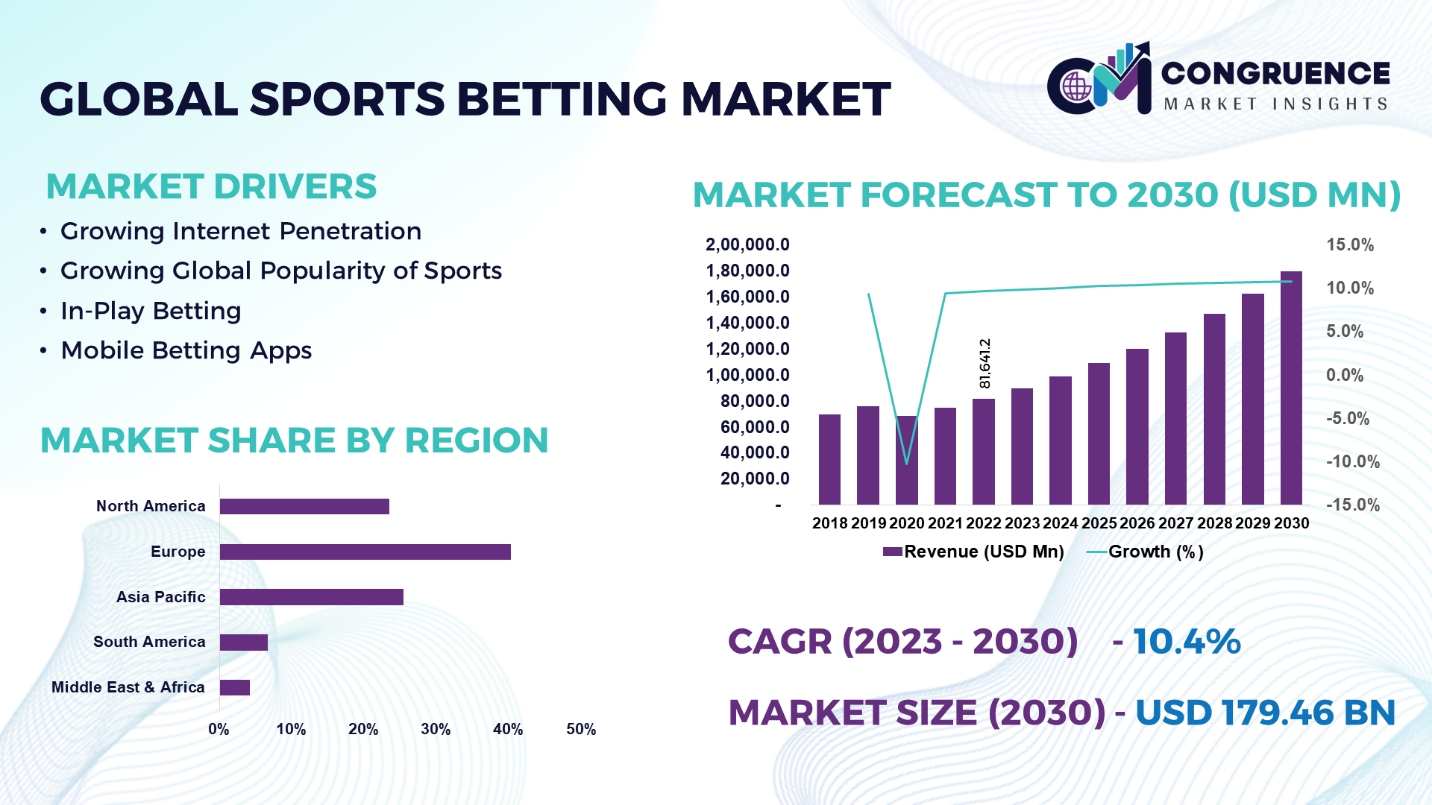Reports
The Global Sports Betting Market was valued at USD 81,641.2 Million in 2022 and is anticipated to reach a value of USD 179,461.9 Million by 2030 expanding at a CAGR of 10.4% between 2023 and 2030.
The vast sector focused on placing bets on the results of different sports events is known as the global sports betting market. This industry includes an extensive array of activities, such as conventional betting on the results of popular sports such as basketball and football, as well as newer trends such as in-play betting and online platforms. The industry has grown significantly as a result of increased accessibility to the internet, technological developments, and the rising global appeal of sports. Regionally-specific legal frameworks, sportsbooks, and online betting platforms are important components of the global sports betting business. A wide range of players, including both long-standing bookmakers and recent arrivals using technology to offer cutting-edge betting experiences, make up the market. Nonetheless, the sector also has to deal with regulatory oversight, responsible gaming policies, and possible match-fixing problems. Global sporting events, technological advancements, and legal changes all have an impact on the dynamic and ever-evolving global sports betting market.

Sports Betting Market Major Driving Forces
Growing Internet Penetration: The amount of people using the Internet globally and its general availability have increased the potential client base for online sports betting sites. More people are engaging in sports betting activities due to easy access to mobile applications and online betting platforms.
Growing Global Popularity of Sports: There has been a sharp increase in interest in sports betting as a result of the growing popularity of sports such as basketball, cricket, football (soccer), and others. Bettors are keen to participate in their favorite sports and teams by staking wagers on the results of games and competitions.
In-Play Betting: The live betting market has seen a radical transformation with the advent of in-play betting. Now that wagering is possible during live events, bettors may interact with the action in real time and take advantage of dynamic betting chances.
Mobile Betting Apps: The market's expansion has been greatly aided by the widespread use of mobile betting apps. In order to accommodate the growing number of customers who want to wager on their smartphones and tablets, mobile applications make sports betting even more practical and easy to use.
Sports Betting Market Key Opportunities
Technological Developments: The whole sports betting experience has been improved by technological developments. Technological improvements, such as user-friendly interfaces and secure payment alternatives, are giving company owners the chance to draw in and keep clients.
Growing Acceptance and Legalization: A safer and more dependable betting environment has been established as a result of the legalization and regulation of online sports betting in several nations and jurisdictions. Legalization has made it possible for business owners and financiers to legitimately draw in clients.
Marketing and Promotions: Online sports betting companies have used aggressive marketing techniques and alluring promotional offers to raise brand recognition and draw in new clients. In order to encourage people to join up and make bets, bonuses, free bets, and loyalty programs are frequently offered. This helps to increase the number of customers.
Sports Betting Market Key Trends
· There has been a notable change in the sports betting market towards mobile applications and internet platforms.
· The ability to wager on events that are now happening has made live or in-play betting more and more popular.
· Many international areas have been reevaluating and revising their sports betting laws.
· Technology breakthroughs such as machine learning and artificial intelligence are being used to evaluate data and generate more precise odds.
· Due to rising internet usage and shifting perceptions of gambling, the sports betting industry has been growing into new and developing areas.
· There is an increasing trend of cooperation between sports teams or leagues and sports betting firms.
· There is a growing trend of using social media platforms for betting.
· Certain sports betting sites are accepting cryptocurrency as payment.
Region-wise Market Insights
Europe accounted for the largest market share at 40.2% in 2022 whereas, Asia Pacific is expected to register the fastest growth, expanding at a CAGR of 11.5% between 2023 and 2030.

The industry for online sports betting is booming in the North American continent, particularly the US. The legalization of sports betting in many states resulted in a notable surge in the sector, hence augmenting its potential. The industry grew as a result of the popularity of sports such as baseball, basketball, and football. One of the biggest and most developed marketplaces for online sports betting is Europe registering 40.2% of market share, accounting USD 32,829.8 Million. Sports betting has a long history in several European nations, and the continent is home to numerous well-known online bookmakers. Significant betting interest is generated in this area by major sporting events including horse racing, football leagues, and tennis competitions. The online sports betting sector showed significant development potential in the Asia-Pacific area with highest CAGR of 11.5%. Due to increased internet penetration and a growing interest in sports, nations such as China, Japan, and India have shown an increasing interest in online sports betting. Popular sports to wager on in this area included football, cricket, and horse racing. Promising prospects were observed in Latin America for the online sports betting industry. A few nations, such as Mexico, Argentina, and Brazil, have thought about regulating and allowing internet sports betting, which might lead to future industry growth.
Market Competition Landscape
Intense competition among major competitors fighting for market share in a sector undergoing dynamic changes characterizes the competitive environment of the global sports betting business. Innovations in technology are crucial, as businesses utilize AI-powered data to improve customer experiences and odds. Competition is further heightened by partnerships between major sports leagues and sports betting companies, which want to gain exclusive rights and access to fan bases. Furthermore, the competitive dynamics are shaped by the regulatory environment, as businesses traverse various legal frameworks around the globe. Some operators' incorporation of cryptocurrency payment alternatives is indicative of a larger industry trend toward the acceptance of digital currencies. In the middle of intense rivalry, operators are starting to set themselves apart by emphasizing the safety and well-being of their patrons. Prominent players in the market include:
· Bet365
· William Hill
· DraftKings
· FanDuel
· Paddy Power Betfair (Flutter Entertainment)
· 888 Holdings
· Betway
· Betfair (part of Flutter Entertainment)
· The Stars Group (now part of Flutter Entertainment)
· Unibet (Kindred Group)
· Betsson
· Smarkets
· MGM Resorts International
· Kambi Group
· Scientific Games
Major online betting companies such as Bet365, 888 Holdings, and Betway provide a variety of gaming alternatives such as casino games, poker rooms, and sportsbooks. Bet365 is renowned for both its user-friendly design and wide selection of live betting choices. Betway offers online casino games, sports betting, and esports betting, whereas 888 Holdings runs brands including 888sport, 888casino, and 888poker. Through its sponsorship of several sports, Betway has grown its brand and penetrated new markets.
|
Report Attribute/Metric |
Details |
|
Market Revenue in 2022 |
USD 81,641.2 Million |
|
Market Revenue in 2030 |
USD 179,461.9 Million |
|
CAGR (2023 – 2030) |
10.4% |
|
Base Year |
2022 |
|
Forecast Period |
2023 – 2030 |
|
Historical Data |
2018 to 2022 |
|
Forecast Unit |
Value (US$ Mn) |
|
Key Report Deliverable |
Revenue Forecast, Growth Trends, Market Dynamics, Segmental Overview, Regional and Country-wise Analysis, Competition Landscape |
|
Segments Covered |
· By Type (Line-In-Play, Fixed Old Betting, Exchange Betting, Daily Fantasy, Spread Betting, E-Sports, Pari Mutuel) · By Platform (Online and Offline) · By Operator (Casinos, Bingo Halls, Card Rooms, Bookmakers, Coin-Operated Gambling Device, Concession Operators, Video Gaming Terminals, Lotteries Operator, Off-Track Sports Betting, and Others) · By Age Group (GEN Z, GEN Y/MILLENIALS, GEN X, Baby Boomers) · By Sports Type (Football, Cricket, Tennis, Baseball, Volleyball, Basketball, Hockey, Horse Riding, Boxing, Golf, Racing, Others) |
|
Geographies Covered |
North America: U.S., Canada and Mexico Europe: Germany, France, U.K., Italy, Spain, and Rest of Europe Asia Pacific: China, India, Japan, South Korea, Southeast Asia, and Rest of Asia Pacific South America: Brazil, Argentina, and Rest of Latin America Middle East & Africa: GCC Countries, South Africa, and Rest of Middle East & Africa |
|
Key Players Analyzed |
Bet365, William Hill, DraftKings, FanDuel, Paddy Power Betfair (Flutter Entertainment), 888 Holdings, Betway, Betfair (part of Flutter Entertainment), The Stars Group (now part of Flutter Entertainment), Unibet (Kindred Group), Betsson, Smarkets, MGM Resorts International, Kambi Group, Scientific Games. |
|
Customization & Pricing |
Available on Request (10% Customization is Free) |
